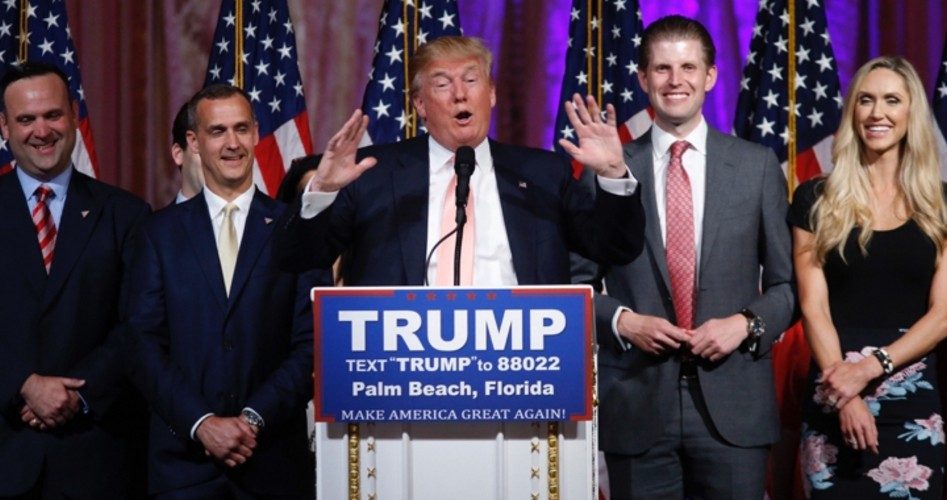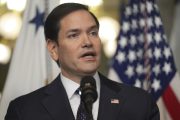
After the dust settled Tuesday night, Donald Trump had won four of the five Republican primaries, Hillary Clinton had won all five of the Democrat Party’s primaries, Bernie Sanders vowed to stay the course regardless, and Marco Rubio bowed out as gracefully as he could.
This put Clinton in the driver’s seat, heading for the Democrat convention in late July in Philadelphia. Counting her “earned” delegates (1,112) and her unearned “superdelegates” (467), she now holds a commanding lead over the Vermont senator, 1,599 to 844. With 28 primaries to go — and 2,320 delegates — Clinton only has to worry about her health and her risk of being indicted over her e-mail scandal to keep her from being crowned queen in Philadelphia.
Donald Trump’s less-than-complete victory on Tuesday, on the other hand, greatly increases the chances of a brokered or contested convention in Cleveland. With Rubio out and Kasich savoring his Ohio victory, the numbers for both Ted Cruz and Donald Trump are daunting. Although Trump now claims 661 delegates, more than halfway to the 1,237 delegates needed to win on the first ballot, he must win 60 percent of the delegates remaining in the 21 last GOP primaries. On Tuesday, even in his smashing win in Florida, Trump failed to get even half the vote.
Assuming that he takes 40 percent of the remaining delegates from here on out, Trump will be 200 delegates short in Cleveland.
For Cruz the numbers are even more worrisome. With 406 delegates, he needs another 831 to take the nomination on the first ballot — an impossible 88 percent.
Here’s where the math gets tricky, putting at risk both Trump’s success on the first ballot, and the viability of the Republican Party as a political force for the foreseeable future. If Kasich and Cruz continue their campaigns with the same degree of success, by July they will have enough votes between them to broker the convention. This is where the backroom deals will be made and the concessions offered and accepted in exchange for those delegates who are freed from their commitments after the first ballot.
Charles Krauthammer said that Tuesday’s results clarified many things:
On the Democratic side, it’s really over. There is really no way that is conceivable that Hillary is going to lose this in the normal way by delegates. It’s either an act of God or an act by the FBI head that would take it away from her.
On the other side, it’s equally obvious. It’s either going to be Trump or Cruz. The likelihood is it’s not going to be decided before the convention unless there is a deal made behind the scenes.
With Trump going to Cleveland in July with fewer delegates than he needs to win on the first ballot, such a result puts the Republican Party leaders in a bind. Will they continue to attack Trump and claim that a vote for him is a vote for Hillary? Will they dare tell the voters who support Trump — many of them voting in primaries for the first time and setting records nearly everywhere — that the leadership has decided someone else deserves the honor of representing the party in November? As the managing editor of Rasmussen Reports, Fran Coombs, expressed it:
It’s not a pretty picture for those who want to maintain control of the Republican Party apparatus. But then it’s pretty clear that the new GOP is not their father’s party. The voter anger at the status quo and the unhappiness with the current breed of Republican leaders aren’t likely to go away after four years of a Hillary Clinton presidency.
Will that leadership blow up Trump the way they did Barry Goldwater in 1964, handing a landslide win to Lyndon Johnson? Or will they embrace — without touching — Donald Trump the way they did Ronald Reagan, and hope to control him by surrounding him with insiders such as Jim Baker (who became Reagan’s chief of staff) in 1980?
At the moment it appears that Cruz and Kasich will be the power brokers in Cleveland.
Photo: AP Images
A graduate of an Ivy League school and a former investment advisor, Bob is a regular contributor to The New American magazine and blogs frequently at LightFromTheRight.com, primarily on economics and politics. He can be reached at [email protected].


